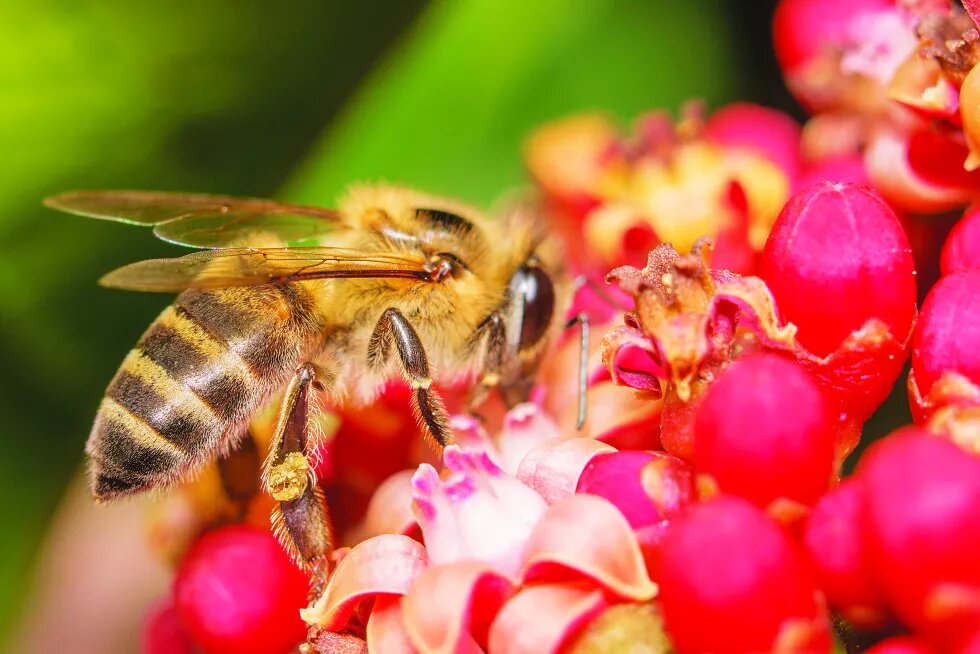
According to FAO, pollinators such as bees, birds and bats, affect 35 percent of the world's crop production, increasing outputs of 87 of the leading food crops worldwide, plus many plant-derived medicines. Across the globe, three out of four crops producing fruits or seeds for human consumption depend, at least in part, on pollinators.
This year as we mark the World Bee Day, it is imperative for all of us to take action protecting pollinators that in essence are the reason we have food on our table. Pollinators are declining due to biodiversity loss as a result of intensive agriculture and the use of toxic chemicals. With the decline of pollinators such as bees, our food security which is already affected by the vagaries of the changing climatic patterns is further stressed.
Food security is achieved when all people, at all times, have physical, social and economic access to sufficient, safe and nutritious food. Many a time we ignore the ‘safety’ aspect so long as there is food on the table. It’s deemed wrong to think of safety when people have limited food to eat especially in the last few months when a drought was eminent.
Talking about harmful pesticides in our commonly consumed foods then becomes a complex matter to address to the public. But this talk has to happen as consumers are at risk, and health of the citizens becomes of key priority. Further, our environment and biodiversity is still compromised which means our future generations will ultimately pay for these adverse effects if not us.
The recommendations by the Health Parliamentary Committee on public petition (no 70 of 2019) regarding withdrawal of harmful pesticides in the Kenyan market has not been fully implemented by respective state agencies. It would be ignorant to have plans of safeguarding our food security when we do not address the various challenges that hamper productivity. The effects of consumption of such harmful chemical residues in our foods can cause severe harm both short term and long term chronic toxicities due to bioaccumulation in the human body over time and this will mean a dent in our health system.
The cost of illnesses and hospitalization are a huge burden to a common mwananchi. Families who have dealt with relatives affected by cancer and other chronic illnesses can attest to the devastating effects of such diseases. We cannot afford to bury our heads in the sand while the public is exposed to chemical residues in foods that pose serious consumer health risks. A look at our open air markets and foods sold is a clear indication all is not well. For example, research has showcased that tomatoes, kales, among other vegetables sold with residues of pesticides used during production ends up on our tables, not forgetting these are the most frequently consumed foods in the Kenyan households, in every meal including raw salads.
It’s time to think of options to safeguard the health and safety of our citizens. Every time I talk to my rural folks about farming and chemical use, they still remain ignorant on this subject. The older or greying population will recount of years when they used to have plenty of harvest with no pesticide use. But now, they can barely get enough yields to sustain their own household consumption. So are these chemicals the solution? Your answer is as good as mine. We have depleted our biodiversity and important pollinators such as bees are not only disappearing but soon we will be hiring pollinators for our farms if we continue with this trend.
Further, the cost of these inputs have also doubled or tripled with time hence increasing the cost of food production. This means that they can only produce enough to eat and less to sell which compromises their livelihoods and income sources. For most rural households, farming doesn’t make commercial sense any more. It’s marred with losses and low quality crops that cannot fetch good prices in the market despite the high cost of inputs such as pesticides.
Scientists are working tirelessly to come up with options that are safe for use and therefore safer alternatives are available. The big question is, why haven’t these options been explored? Why do we still have toxic pesticides in use? Who should be responsible? In a food system and for every food value chain, it’s the responsibility of every actor to assure that food is safe at every point of the food system. Clearly, there are gaps that need to be addressed to ensure safe food production and ultimately food security.
Food safety is of utmost importance to the public. It’s the right of every citizen to access safe and nutritious food. It’s high time we identify emerging issues, and help the government prioritize future actions and attentions on key focal areas with regard to pesticide use.
As a scientist, I look forward to the day that we have data-driven policy changes that can transform our food systems. Further, to have leaders who can assess the pesticides impact and take a clear-eyed look at its effects and how to overcome them which should be coming from the leading voices in the agricultural development space, from parliamentarians to researchers to representatives of regulatory agencies mandated to assure safe food production and consumption.
The right to food entails access to safe and nutritious food for everyone. It’s the responsibility of every stakeholder engaged in manufacturing, advertising and distribution of pesticides to assure that the pesticide products in the market are safe for use by farmers. This requires transparency, openness and accountability to safeguard the safety and health of every consumer. Let’s keep our food systems safe and our consumers assured.
Dr Catherine Kunyanga is a senior lecturer, the University of Nairobi, Department of Food Science, Nutrition and Technology. ckunyanga@uonbi.ac.ke
This article was first published on the Standard Daily and Business Daily on 23rd May 2022